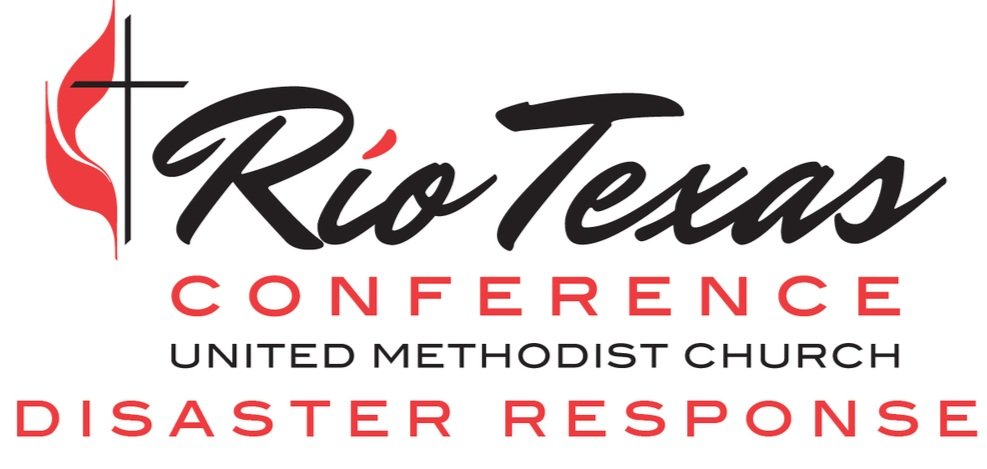The mission of United Methodist Disaster Response in the Rio Texas Conference is to provide caring Christian presence in the aftermath of a disaster that begins with response and ends with long term recovery.
Leadership
Leadership of the disaster response effort of the Rio Texas Conference is the responsibility of the Conference Disaster Response Committee. It is chaired by the Conference Disaster Response Coordinator and includes District Disaster Response Coordinators from each of the seven districts, the manager of the Martinez Disaster Response Center, the Disaster Response Communications Coordinator and the Director of the Outreach Vitality Center. Additional at large members may be asked to serve as the need arises. Individual members of the committee may have specific operational functions, but the task of the committee is to establish policies and evaluate effectiveness of the Conference Disaster Response Effort.
What kinds of disasters do we respond to?
The Disaster Response effort of the Rio Texas Conference is primarily focused on natural disasters such as floods, fires, tornadoes and hurricanes. Other disasters, often called “man- made” may result from terrorism and domestic disturbances or from accidents such as chemical spills. Resources of the conference could be used to assist individuals and families impacted by these disasters as well. Attention has been given to preparation for disasters related to pandemics.
How does the Rio Texas Conference respond to disasters?
The Disaster Response Committee of the Rio Texas Conference stands ready to assist any time disasters are so large that the resources of the local community or the District are not sufficient to meet the needs. This response can take many forms. Expert advice can be provided to help the local community as they meet immediate needs, or as they plan for recovery from a disaster; UMCOR kits such as clean-up kits and health kits are distributed; and, volunteers can also be recruited by the Conference. Early Response Teams are deployed to assist with clean-up and other tasks needed by the community in the period right after the disaster (once the area has been declared safe by first responders). In the long term, UMVIM recovery teams help with home repairs or, in some cases, rebuilding homes that have been completely destroyed during the disaster. In addition, Spiritual and Emotional Care teams can provide support to individuals and congregations as they cope with the loss caused by a disaster.
The United Methodist Disaster Response in the Rio Texas Conference rarely acts alone. We work with partners in order to provide the best possible relief to survivors of the disaster. The most important partners are The United Methodist Committee on Relief (UMCOR) and Voluntary Organizations Active in Disaster (VOAD).
Our relationship to UMCOR
The United Methodist Committee on Relief (UMCOR) is a vital partner in the disaster response effort of the Conference. We are truly an UMCOR partner agency. They provide training before and during disaster response; they provide expert consultants to help the conference meet special needs during and after a disaster; they provide emergency funds immediately after a disaster so the conference has resources to respond quickly when disaster strikes; and, they provide important resources to assist with long term recovery.
Our relationship with VOAD
Voluntary Organizations Active in Disasters (VOAD) is a coalition of non-profit and non-governmental organizations working in disaster response. We are active in the Texas VOAD as well as local VOAD chapters in San Antonio and Corpus Christi. United Methodist Disaster Response in the Rio Texas Conference rarely responds to a disaster alone. Rather, we respond as part of a cooperative effort with other organizations that have similar goals. This cooperation is facilitated by our membership in VOAD. VOAD organizations also cooperate and coordinate with the Texas Department of Emergency Management.
Volunteer opportunities
The best volunteer is a trained volunteer. The primary training offered by the Conference is Early Response Team Training. This day long training prepares volunteers to participate in disaster response in the early stages of the effort. Early Response team members must have a Conference criminal background check and must be at least 18 years old. Early Response Teams are normally only deployed for a few weeks following a disaster.
Long Term Recovery may take several years to complete because it involves repairing damaged homes or, in some cases, completely rebuilding homes. United Methodist Volunteer in Mission (UMVIM) teams can provide the volunteer labor so the cost of repairs is much lower. These volunteers are requested to have a trained leader and require criminal background checks and child safety training. UMVIM teams are also open to youth. There are nearly always opportunities to work in long term recovery somewhere in the Conference.
Volunteers are also needed in administrative and supply support. The Martinez Disaster Response Center in Kerrville, Texas is now operated by the Rio Texas Conference. The Center serves as a collection center for UMCOR kits from the Rio Texas Conference and other conferences in the region. An inventory of clean up and health kits is maintained for distribution during regional disasters. The center also serves as storage for equipment used by disaster response teams from the Rio Texas Conference.
Please sign up for volunteer opportunities to aid in disaster recovery. You are needed!


